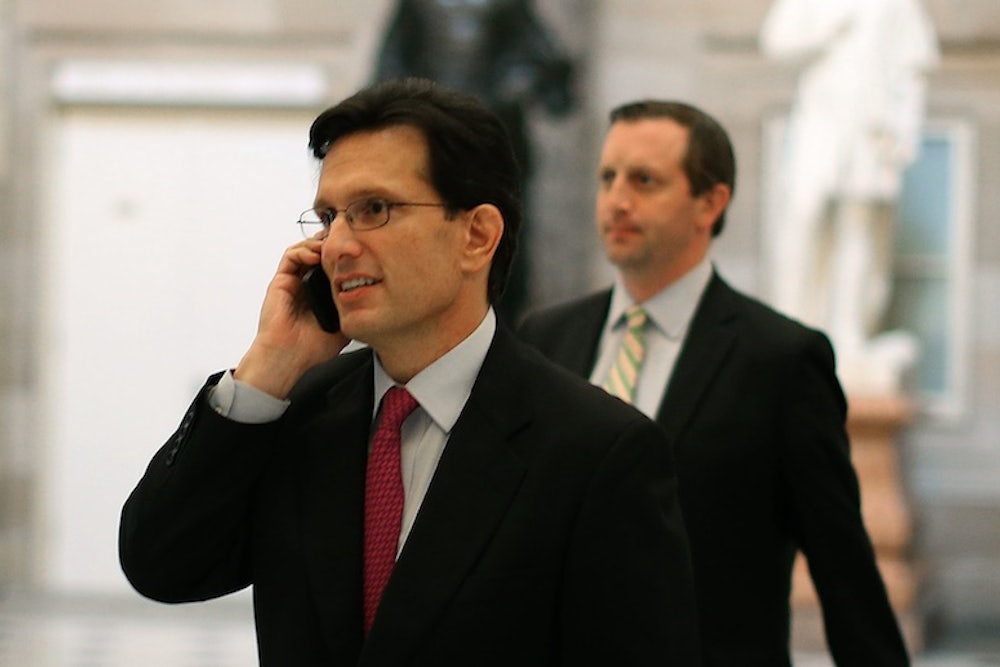Republican leaders and, finally, many of their followers are coming to grips with the obvious: They can't use the government shutdown or threat of default to kill Obamacare. But some conservatives aren’t quite ready to give up—whether because of heartfelt sentiment or political opportunism, or some combination of the two. That’s left GOP leaders searching for some kind of blow they can deal, ideally as they negotiate a way to restore govenrment funding and raise the debt ceiling. Apparently that’s led them back to the medical device tax.
This shouldn’t surprise anybody. The tax is highly unpopular in Congress: A non-binding vote calling for its repeal passed the Senate with 72 votes in March. But would repealing the tax for real satisfy the conservative agitators who insist the fiscal fight must still about Obamacare? That’s a lot less clear.
The tax is a 2.3 percent levy on all medical devices, a category that includes everything from hip implants to surgical gloves. Its primary purpose is to generate revenue—about $30 billion over ten years—in order to help pay for the expansion of Medicaid and creation of new tax credits that will help low- and middle-income Americans get health insurance. When architects of the Affordable Care Act were still crafting their bill, they asked every part of the health care industry to give up some revenue, in one way or another, on the theory that the program should involve shared sacrifice—and that the industries would simultaneously be making more money because they’d have millions of newly insured, paying customers. That's how the tax came to be, although device industry officials never agreed to it in the way that representatives of the drug and hospital industries signed off on the cuts and fees affecting their members.
Like all taxes, the device levy has its pluses and minuses. I wrote about them a few weeks ago. (You can read my assessment here. For a more recent assessment of claims made by critics of the tax, I recommend Eugene Kiely of Factcheck.org.) But whatever the actual merits, it’s not one of Obamacare’s critical pillars. And that could diminish its appeal on the right. Taking the tax away wouldn’t destabilize the insurance market or seriously undermine the program’s effectiveness, in the way repealing the individual mandate would. It would simply take away some money, just like eliminating the employer mandate would. Lawmakers would have to replace the funds somehow and, as Chye-Ching Huang of the Center on Budget and Policy Priorities has pointed out, the ideas lawmakers have proposed so far involve a lot of gimmickry. But even if such a sketchy solution passed, Obamacare on the whole would operate more or less as it did before. Conservative leaders say they want a mortal blow to Obamacare. This would barely qualify as a glancing one.
The other political complication is that repealing the device tax would look like a favor to a special interest. And, notwithstanding arguments for or against the tax, appearances in this case are probably correct. It’s highly unlikely that Senate bill got 72 votes because so many lawmakers, including about half the Democratic caucus, are worked up about the device tax on principle. No, the most likely explanation is that the device industry has a ton of influence, particularly in states where they have large operations. Among those who have endorsed repeal (though not explicitly as part of a debt ceiling or shutdown negotiation) are two liberal icons in the Senate, Al Franken and Elizabeth Warren. Both say they oppose the tax on the merits. Both also represent states with influential device makers. Medtronic, the nation’s fourth largest device maker, is in Minneapolis. Boston Scientific and Coviden, the eighth and ninth largest, have U.S. headquarters in Massachusetts. My colleague Alec MacGillis wrote about Warren and the device industry a year ago—it’s worth a read if you want to understand what’s going on behind the scenes in Congress right now. Or you can just consider the fact that senator-turned-lobbyist Evan Bayh has adopted device tax repeal as one of his causes. That’s usually a pretty good clue about how much special interest money is behind a campaign.
Maybe none of this would matter to conservatives. Maybe, given the alternatives, they’d celebrate device tax repeal as an important step towards undoing the president’s health care law. But that’s hardly a given. On Wednesday morning, in a highly publicized appearance, Heritage Action CEO Mike Needham didn't seem to think device tax repeal would be any great achievement. According to an account in the Weekly Standard, Needham called it a “laughably bad” example of cronyism. For once, he may be right.
